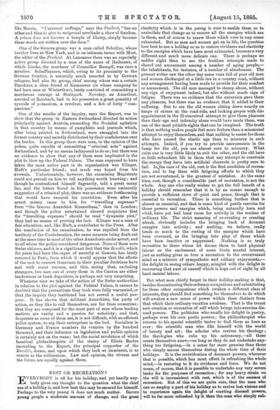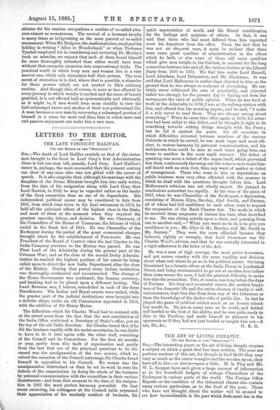REST OR RECREATION?
EVERYBODY is off for his holiday, and yet hardly any- body gives any thought to the question what the chief use of a holiday is, and how best this may be secured for himself. Perhaps to the very young it does not much matter. Secure young people a. moderate amount of change, and the great elasticity which is in the young is sure to enable them so to assimilate that change as to restore all the energies which are in them, and of course to renew those which were in any sense exhausted. But as men and women get on in life, the question how best to use a holiday so as to restore vividness and elasticity to the energies which have been most exhausted, becomes a very different and much more delicate one. There is perhaps no sadder eight than to see the fruitless attempts made to shovel out amusement among a number of aging people,— the inhabitants, for instance, of a number of almshouses. The present writer saw the other day some vans full of poor old men and women discharged at a little inn in a country road, without any arrangement having been made to provide for their comfort or amusement. The old men managed to stamp about, without any sign of enjoyment indeed, but also without much sign of fatigue. There was no evidence that the excursion gave them any pleasure, but there was no evidence that it added to their suffering. But to see the old women sitting down wearily on heaps of stones at the road-side, and looking greyer with dis- appointment in the ill-conceived attempt to give them pleasure than their age and infirmity alone would have made them, was one of the most pitiable sights that can be imagined. The truth is that nothing makes people feel more forlorn than a miscarried attempt to enjoy themselves, and that nothing is easier for those who have passed the elastic age than to miscarry in such attempts. Indeed, if you try to provide amusements in the lump for the old, you are almost sure to miscarry. What suits one is very little likely to suit the other, and the old have so little redundant life in them that any attempt to constrain the energy they have into artificial channels is pretty sure to fail. In the case of the old, rest is the first condition of recrea- tion, and to fag them with fatiguing efforts to which they are not accustomed, is the greatest of mistakes. At the same time, rest, though a considerable part of recreation, is not the whole. Any one who really wishes to get the fall benefit of a holiday should remember that it is by no means enough to provide a sufficient store of quiet and peace, though that is essential to recreation. There is something further that is almost as essential, and that is some kind of gentle exercise for those powers and energies which, being naturally keen and vivid, have yet had least room for activity in the routine of ordinary life. The strict meaning of re-creating or creating afresh, obviously includes the bringing back of dormant energies into activity ; and nothing, we believe, really tends so much to the resting of the energies which have been overused, as the bringing into play of those which have been inactive or suppressed. Nothing is so truly recreation to those whose lot dooms them to hard. physical labour as the excitement of some lively mental interest, just as nothing gives so true a recreation to the overstrained mind as a mixture of sympathetic and solitary enjoyments,— the delight in seeing others happy, mingled with the delight in recovering that part of oneself which is kept out of sight by all hard mental labour.
But what men chiefly forget in their holiday-making is that, besides discontinuing their ordinary occupations and substituting for them other occupations which awaken a different class of interests, they should find something for themselves to do which will awaken a new sense of power within them distinct from that which their ordinary vocation awakens. That is the truest new creation or recreation of self which brings into exercise dis- used powers. The politician who recalls his delight in poetry, perhaps even his own poetic powers ; the philanthropist who returns to his special scientific tastes to find them as keen as ever ; the scientific man who fills himself with the world of beauty and art; the scholar who revives his theology ; the theologian who rubs up his astronomy,—all these create themselves anew,—so long as they do not undertake any- thing too fatiguing,—in a sense far more genuine than those who simply amuse themselves during the whole time of their holidays. It is the revivification of dormant powers, wherever that is possible, which has most effect in refreshing the whole mind,—in restoring to it its vividness and force. We do not mean, of course, that it is possible to undertake any very severe tasks for the purposes of recreation ; for any heavy strain on the will is inconsistent with rest, which is of the essence of recreation. But of this we are quite sure, that the man who can so employ a part of his holiday as to revive lost visionaand to experience again the delight of exerting disused powers, will be far more refreshed by it than the man who simply sub-
stitutes for his routine occupations a routine of so-called plea- sure almost as monotonous. The revival of a dormant faculty is many times as invigorating as the mere pursuit of so-called amusement. When Mr. Dodgson, the mathematician; employed his holiday in writing "Alice in Wonderland," or when Professor Tyndall employed his in considering and reviewing Dr. Mozley's book on miracles, we suspect that each of them found himself far more thoroughly refreshed than either would have been without that energetic excursion into unaccustomed fields. The practical world in which busy men and women live is a very narrow one, which only stimulates half their powers. The true secret of recreation is to find, where that is possible, a stimulus for those powers which are not exerted in life's ordinary routine. And though this, of coarse, is more or less effected by every journey in which wonder is excited and the sense of beauty gratified, it is not effected half as systematically and effectually as it might be, if men would keep more steadily in view the half-submerged tastes and studies of their non-professional life. A man becomes a new man by recovering a submerged portion of himself in a sense far more real than that in which mere rest and passive enjoyment can make him a new man.



































 Previous page
Previous page